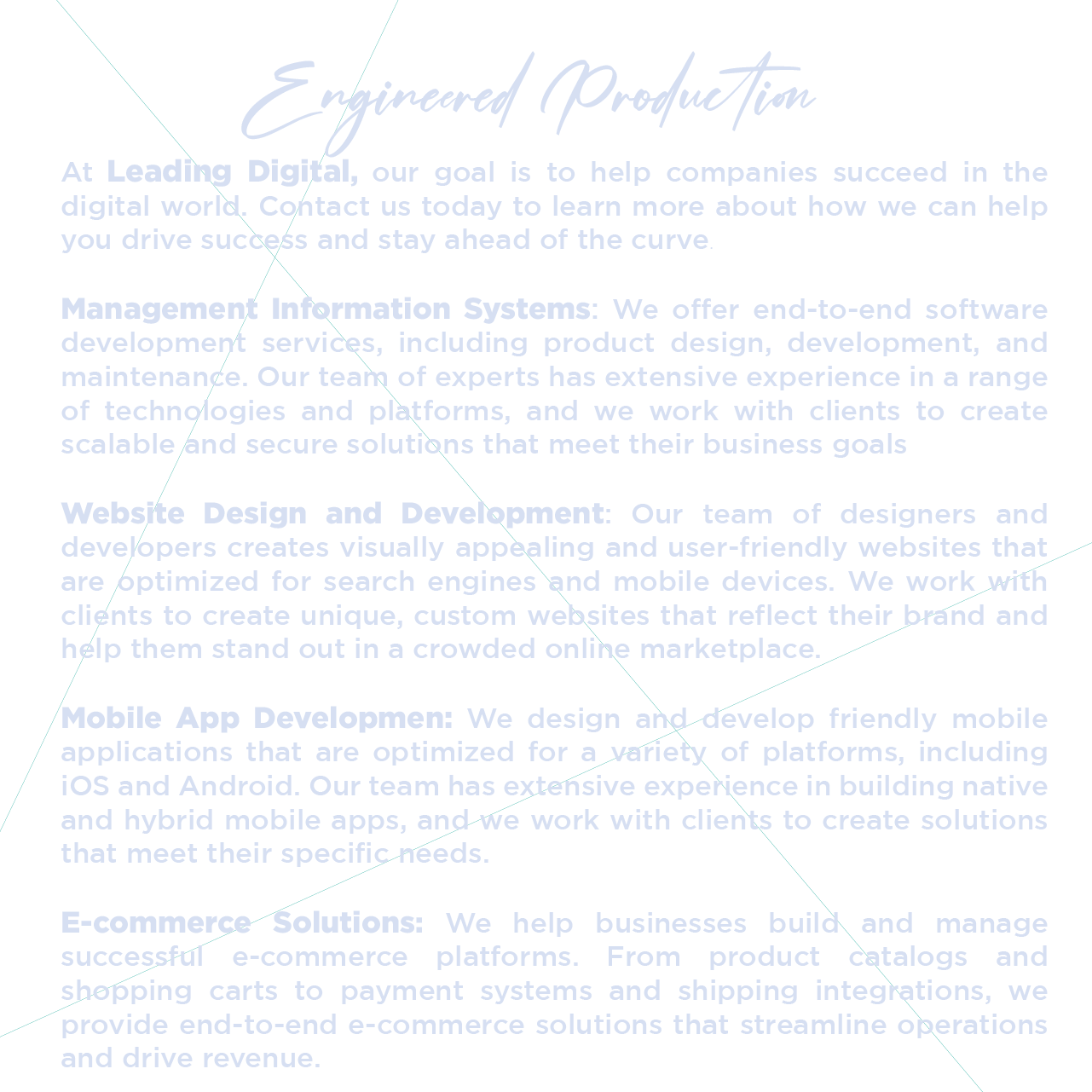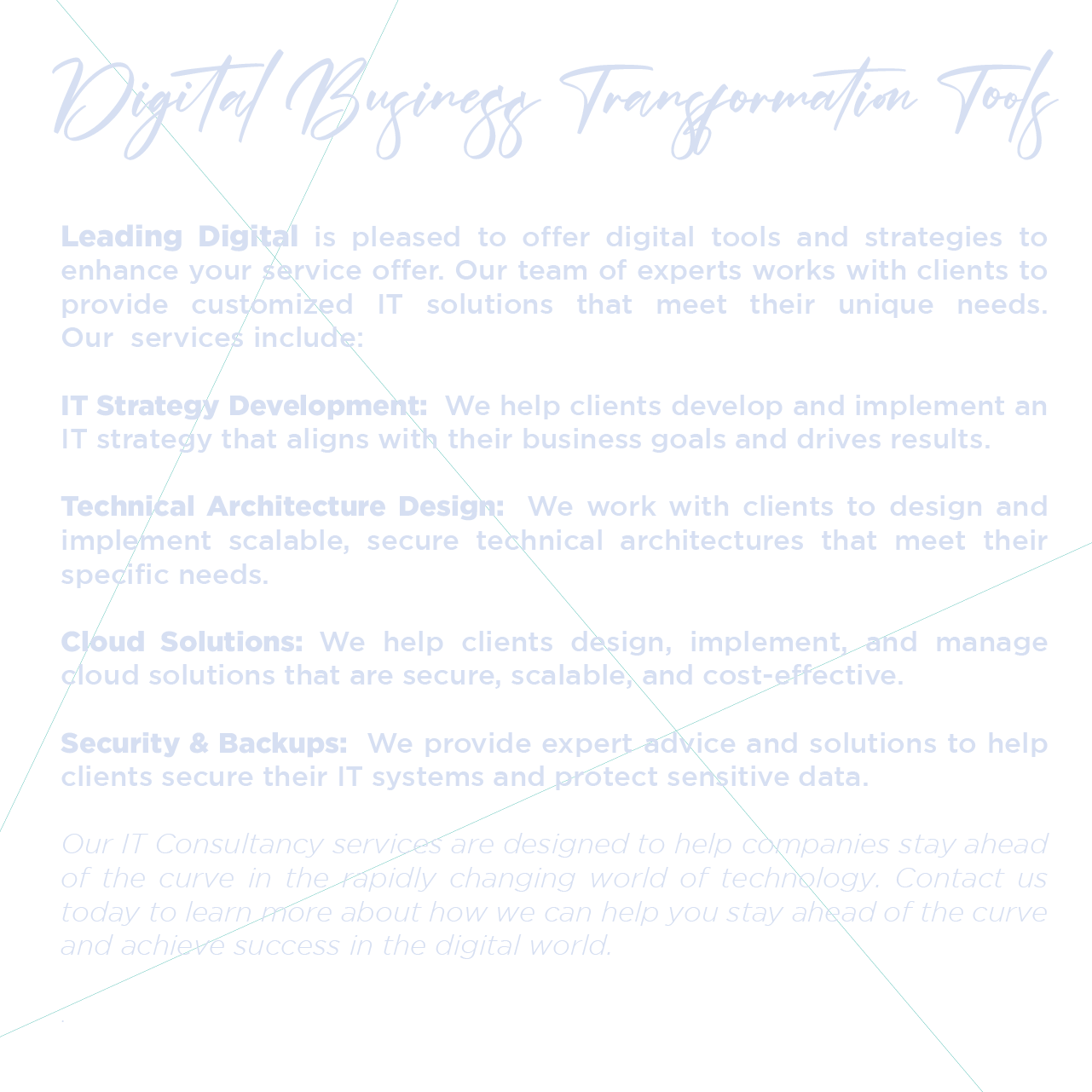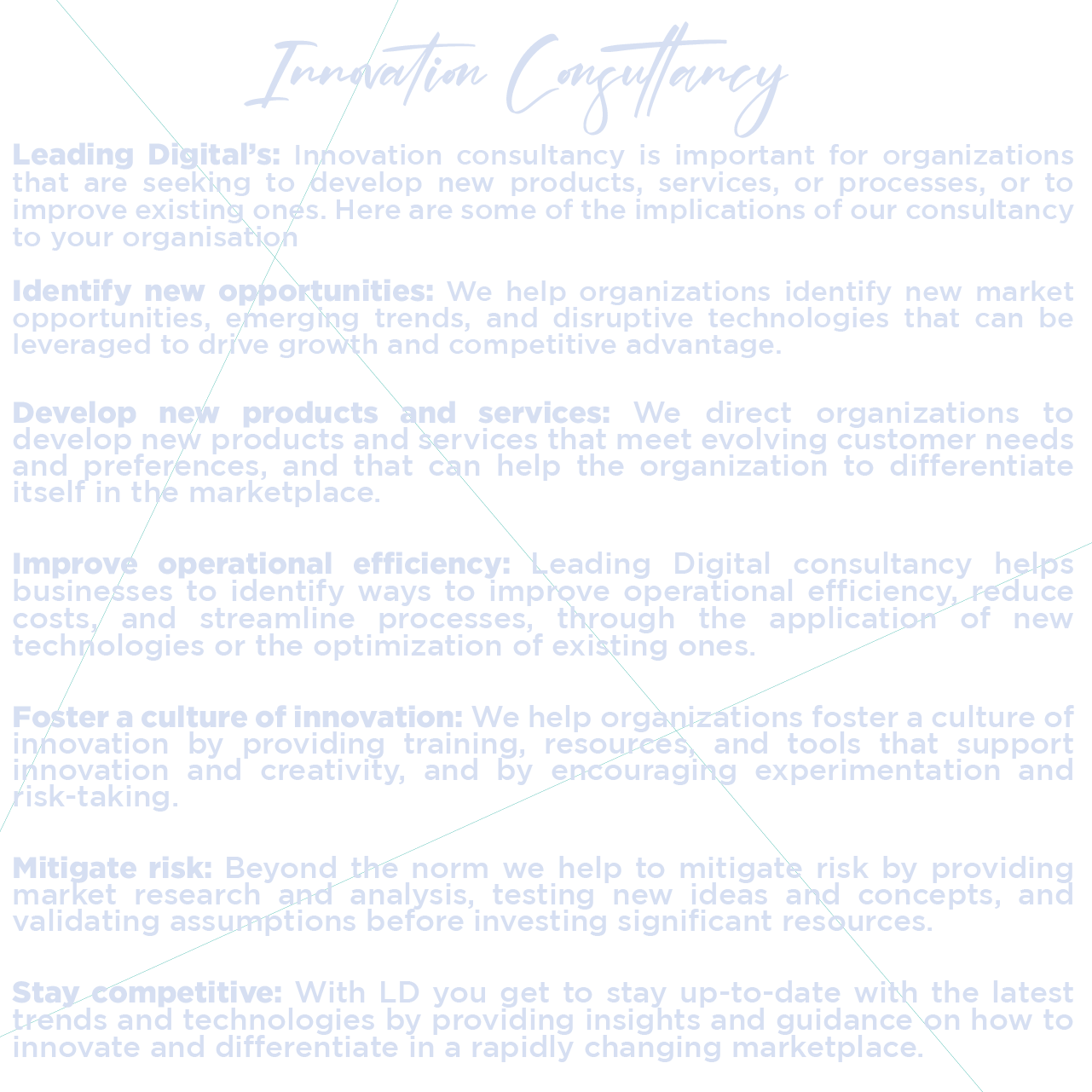What We do
Partners
Digital Transformation
Our Digital Business Consulting services are designed to help companies stay ahead of the curve in the digital landscape and to achieve success in the digital world
Digital Strategy Development
We help clients develop and implement a comprehensive digital strategy that aligns with their business goals and drives growth.
Digital strategy development involves the process of creating and implementing a plan to maximize the use of digital technology and media to achieve business objectives. This involves identifying and prioritizing key digital channels, developing a roadmap for implementing digital initiatives, and measuring the effectiveness of these initiatives to optimize results.
At its core, a comprehensive digital strategy should be designed to help businesses leverage the power of digital technologies to attract and retain customers, improve operational efficiencies, increase revenue, and ultimately drive growth. This may involve developing a strong online presence, optimizing search engine visibility, implementing social media and content marketing strategies, and using data analytics and insights to inform decision-making.
A successful digital strategy must also be aligned with the business's overall goals and objectives, as well as with the needs and preferences of its target audience. This requires a deep understanding of the customer journey and the different touchpoints where digital technologies can be leveraged to enhance the customer experience.
Customer Experience Design
We work with clients to design and implement customer-centric solutions that improve the user experience and drive engagement.
Customer experience (CX) design is the process of creating a positive and seamless experience for customers across all touchpoints with a business. It involves designing customer-centric solutions that prioritize the needs and preferences of the customer in order to improve the user experience and drive engagement.
At the core of CX design is the understanding that every interaction a customer has with a business shapes their perception of the brand. Therefore, it's important to design experiences that are consistent, seamless, and easy to use, regardless of the channel or device being used.
To achieve this, CX designers typically engage in a user-centered design process, which involves gathering insights and feedback from customers to inform the design of products, services, and interactions. This may include conducting user research, developing personas, mapping customer journeys, and prototyping and testing solutions to ensure they meet the needs and expectations of customers.
The goal of CX design is to create solutions that not only meet the functional needs of the customer but also create an emotional connection that fosters loyalty and drives engagement. This requires a deep understanding of the customer's motivations, pain points, and preferences, as well as the ability to anticipate their needs and deliver personalized experiences that resonate with them.
Overall, Leading Digital's CX design is a critical component of any successful business strategy, as it can help to differentiate a brand from its competitors, increase customer satisfaction and loyalty, and drive growth by fostering a positive customer experience.
Digital Transformation Planning
We help clients plan and execute digital transformation initiatives that streamline operations and drive efficiency.
Digital transformation planning involves the process of using digital technologies to fundamentally change how a business operates and delivers value to its customers. This involves identifying and implementing new technologies, processes, and organizational structures to enable the organization to become more agile, efficient, and customer-focused.
The goal of digital transformation is to create a more flexible, responsive, and innovative organization that can quickly adapt to changing market conditions and customer needs. This may involve developing new business models, adopting new technologies such as automation, artificial intelligence, and cloud computing, and leveraging data and analytics to inform decision-making.
Fundamentally digital transformation planning is the identification of key business objectives and pain points that can be addressed through digital technologies. This may involve a comprehensive review of existing business processes, technologies, and organizational structures to identify opportunities for improvement and optimization.
Once these opportunities have been identified, a digital transformation roadmap is developed to guide the implementation of new technologies and processes. This roadmap should be aligned with the organization's overall business strategy and should prioritize initiatives that have the greatest potential to drive efficiency, streamline operations, and enhance the customer experience.
Successful digital transformation planning requires a deep understanding of the organization's business model, culture, and strategic goals, as well as a thorough knowledge of the latest digital technologies and trends. It also requires strong leadership and a willingness to embrace change and innovation in order to achieve long-term success.
Performance Optimization
We use data-driven insights and best practices to optimize digital channels and drive results.
Performance optimization is the process of using data-driven insights and best practices to improve the effectiveness of digital channels and drive results. This involves analyzing key performance metrics, identifying areas for improvement, and implementing targeted changes to improve the overall performance of digital marketing campaigns, websites, and other digital assets.
Our performance optimization is the use of data to inform decision-making. This may involve tracking and analyzing key metrics such as website traffic, click-through rates, conversion rates, and engagement levels to identify patterns and trends that can be used to inform changes and optimizations.
Performance optimization may also involve implementing best practices in areas such as search engine optimization (SEO), user experience design, content marketing, and social media marketing. This requires a deep understanding of the latest trends and best practices in these areas, as well as the ability to apply this knowledge to specific campaigns and initiatives.
The goal of performance optimization is to continuously improve the effectiveness and efficiency of digital channels, driving better results and a higher return on investment (ROI). This requires ongoing testing, measurement, and optimization of digital marketing campaigns and other initiatives, in order to identify opportunities for improvement and make changes that drive better performance.
Overall, performance optimization is a critical component of any successful digital marketing strategy, as it allows businesses to continually improve the effectiveness of their digital channels, drive better results, and stay ahead of the competition.




































